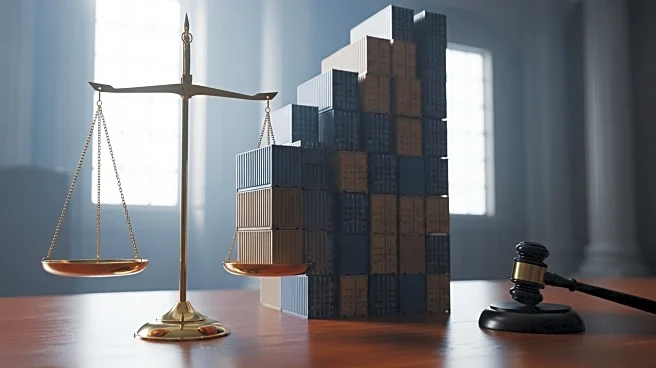What's Happening?
A federal appeals court has determined that President Trump overstepped his presidential powers by imposing tariffs under an emergency-powers statute. The court ruled that only Congress has the authority to implement such extensive measures. Despite this ruling, the tariffs will remain in place as the case continues. The decision affects tariffs that Trump imposed on various countries, including a 25% tariff on goods from Canada, China, and Mexico, citing their failure to curb fentanyl flows. However, tariffs under other laws, such as those on steel and aluminum, remain unaffected. The ruling has sparked debate, with dissenting judges arguing that the International Emergency Economic Powers Act was appropriately used by Trump. The administration plans to appeal to the U.S. Supreme Court.
Why It's Important?
The ruling has significant implications for U.S. trade policy and the balance of power between the executive and legislative branches. Businesses and consumers have faced uncertainty due to the unpredictable nature of tariff policies, affecting inventory planning and supply chain management. The decision underscores the constitutional principle that presidential actions must adhere to the rule of law, potentially reshaping how future administrations approach trade measures. Economists have noted that tariffs may slow economic growth and contribute to inflation, impacting the broader economy. The outcome of this legal battle could influence U.S. trade relations and economic strategies moving forward.
What's Next?
The administration is likely to appeal the decision to the U.S. Supreme Court, which could further delay any changes to the current tariff policies. Meanwhile, the Court of International Trade may reconsider the case, potentially altering the scope of the ruling. Businesses and trade partners will be closely monitoring these developments, as they could lead to shifts in international trade dynamics. The administration may explore alternative legal avenues to impose tariffs, such as launching investigations under different sections of trade laws. The ongoing legal proceedings will continue to create uncertainty in the market, affecting business strategies and economic forecasts.
Beyond the Headlines
The case highlights the complex interplay between executive power and legislative authority in U.S. governance. It raises questions about the limits of presidential power in economic matters and the role of the judiciary in checking executive actions. The decision may prompt discussions on the need for clearer guidelines regarding the use of emergency powers in trade policy. Additionally, the ruling could influence future legislative efforts to redefine the scope of presidential authority in economic affairs, potentially leading to reforms in trade law.









